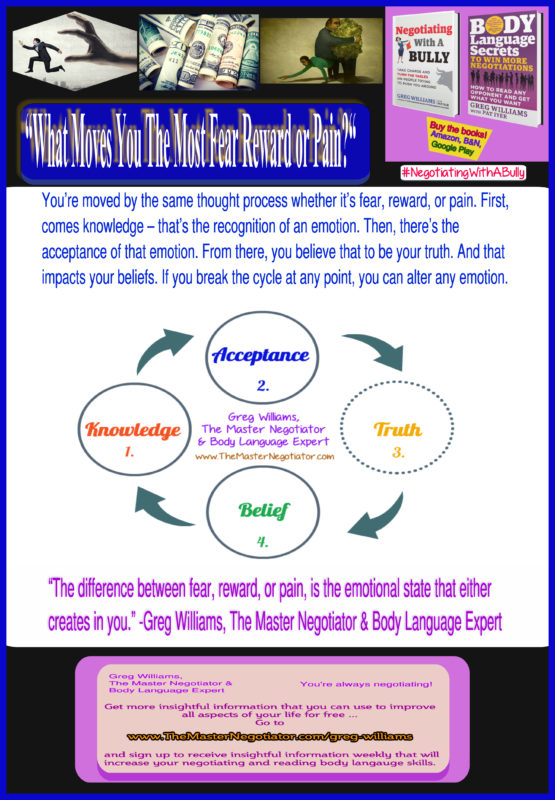What Moves You the Most Fear: Reward or Pain?
What Moves You the Most Fear: Reward or Pain? https://csuiteold.c-suitenetwork.com/advisors/wp-content/themes/csadvisore/images/empty/thumbnail.jpg 150 150 Greg Williams, MN, CSP https://secure.gravatar.com/avatar/1f08a50bcaed92eae0990a65c7808a62?s=96&d=mm&r=g
“The difference between fear, reward, or pain, is the emotional state that either creates in you.” -Greg Williams, The Master Negotiator & Body Language Expert
Do you know what moves you to action the quickest? I know it depends on the circumstance you’re in. But sometimes, we’re moved more by fear than reward or pain.
You should always be aware of what moves you to action in any situation. Doing so allows you to be more aligned with your decision-making process. And that allows you to understand why you choose to engage in certain actions.
The following are thoughts to consider when assessing how to decide about an action you’ll take. Being aware of those observations will also help you identify the source of motivation that’s controlling your thoughts.
Fear: Most people are motivated more by the fear of loss versus the reward of gain. You can test yourself by examining something that’s of value to you. Assess to what degree you’d feel pain if you no longer had it. Now compare that to other items (i.e. people, things) that you value. Now how do you feel? Through that quick simulation, you’ve prioritized what is of value to you. And, you’ve assessed the emotional state you’d be in if you no longer had it. You can make the same calculations when weighing the benefits of possibly acquiring something new versus not doing so because of where that process might lead. Also remember, something new carries intrinsic risks – it’s unknown – it has no history and thus no track record. It might look good in the beginning and be fraught with hidden dangers to come.
Reward: This can be a great motivator. But you should also note why you’re driven by a reward. If the driving force is to escape what you’re moving from, you should consider that fear might be the predominant source that’s motivating you. That’s important because you don’t want to think you’re driven by reward when the source is fear. The two motivators are directed by different mindsets within you.
The true motivation of reward might appear as you being happy and seeking more to enhance that feeling. As a result, you’re willing to take a risk to obtain what you seek. Always question when seeking a reward what the hidden risk is. Question to what degree it’s the loss of something that you’re familiar with. Thus, make your calculations appropriately to determine if you’re propelled by moving towards or away from something.
Pain: Pain can be a feisty motivator. On the one hand, most people attempt to avoid pain. Then, there are those that embrace it as a source to grow from. Either psyche may be the motivator that moves you to action.
Like the association that fear and reward have to one another, the avoidance of pain can be the conductor that divides one direction from another. That’s to say, if you’re predominately attempting to avoid pain, you may forgo the risk of reward. If you’re immune to pain, you may be more daring. Again, there’s a thin mental line that separates the mindset that’ll move you in one direction versus another. Know what that mindset is.
Always attempt to understand the sources that motivate you. They’re the lifeblood of your being. Thus, the more you know the process that controls its flow, the better you’ll be able to direct it … and everything will be right with the world.
What does this have to do with negotiations?
In a negotiation, you’ll be motivated to take action based on fear, reward, or pain. If you’re aware of the driving force that motivates you to action, you should be better positioned to control those actions. By being in greater control of yourself, you’ll be in greater control of the negotiation and the other negotiator. That means that he won’t be able to easily ‘push your buttons’ … and everything will be right with the world.
Remember, you’re always negotiating!
After reading this article, what are you thinking? I’d really like to know. Reach me at Greg@TheMasterNegotiator.com
To receive Greg’s free “Negotiation Tip of the Week” and the “Sunday Negotiation Insight” click here http://www.themasternegotiator.com/greg-williams/
#Fear #Reward #Pain #Negative #Stop #Thoughts #Emotion #Business #Progress #SmallBusiness #Negotiation #NegotiatingWithABully #Power #Perception #emotionalcontrol #relationships #HowToNegotiateBetter #CSuite #TheMasterNegotiator #ControlEmotions

